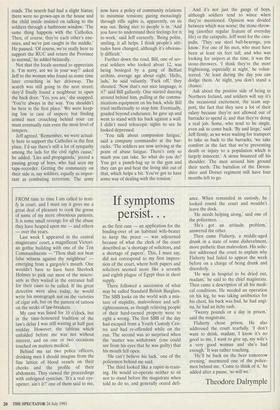If symptoms persist..
FROM time to time I am called to testi- fy in court, and I must say it gives me a great deal of pleasure to cook the goose of some of my more obnoxious patients. It is some small revenge for all the abuse they have heaped upon me — and others — over the years.
Last week I appeared in the central magistrates' court, a magnificent Victori- an gothic building with one of the Ten Commandments — `Thou shalt not bear false witness against thy neighbour' emerging from a gargoyle's mouth. One wouldn't have to have been Sherlock Holmes to pick out most of the miscre- ants as they waited in the entrance hall for their cases to be called. If the great detective were alive today, he would write his monograph not on the varieties of cigar ash, but on the pattern of tattoos on the necks of law-breakers.
My case was listed for 10 o'clock, but in the time-honoured tradition of the law's delay I was still waiting at half past midday. However, the tableau which unfolded before me was not without interest, and on one or two occasions touched on matters medical.
Behind me sat two police officers, drinking men I should imagine from the fine lattice of blood vessels on their cheeks and the profile of their abdomens. They viewed the proceedings with unfeigned cynicism. 'It's a real eye- opener, ain't it?' one of them said to me, as the first case — an application for the binding-over of an habitual wife-beater to keep the peace — was adjourned because of what the clerk of the court described as `a shortage of solicitors, and a shortage of papers'. This, I must say, did not correspond to my first impres- sion of the court, where both papers and solicitors seemed more like a seventh and eighth plague of Egypt than in short supply.
There followed a succession of what may be called Standard British Burglars. The SBB looks on the world with a mix- ture of stupidity, malevolence and self- righteousness, as though relieving people of their hard-earned property were to right a wrong. The first SBB of the day had escaped from a Youth Custody Cen- tre and had re-offended while on the run. The second was so surprised when the 'matter was withdrawn' (one could see from his eyes that he was guilty) that his mouth fell open.
`He can't believe his luck,' one of the policemen behind me said.
The third looked like a rapist-in-train- ing. He would co-operate neither to sit nor to stand before the magistrate when told to do so, and generally oozed defi- ance. When remanded in custody, he looked round the court and wouldn't leave the dock.
`He needs helping along,' said one of the policemen.
`He's got an attitude problem,' answered the other.
Then came Flaherty, a middle-aged drunk in a state of some dishevelment, more pathetic than malevolent. His solic- itor addressed the court to explain why Flaherty had failed to appear the week before on a charge of being drunk and disorderly.
`He was in hospital to be dried out, madam,' he said to the chief magistrate. Then came a description of all his medi- cal conditions. He needed an operation on his leg, he was taking antibiotics for his chest, his back was bad, he had angi- na, he had an itchy rash.
`Twenty pounds or a day in prison,' said the magistrate.
Flaherty chose prison. He also addressed the court tearfully. `I don't want to drink, madam, I know it's no good to me, I want to give up, my wife's a very good woman and she's had enough.' It was rather touching.
`He'll be back on the beer tomorrow evening,' murmured one of the police- men behind me. 'Come to think of it,' he added after a pause, `so will we.'
Theodore Dalrymple


















































 Previous page
Previous page